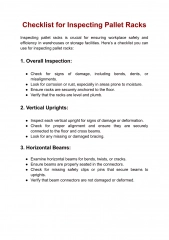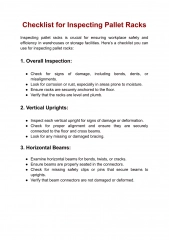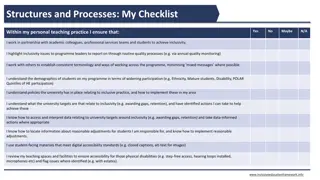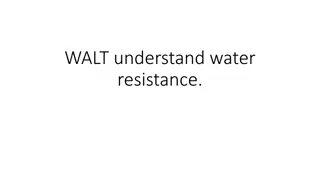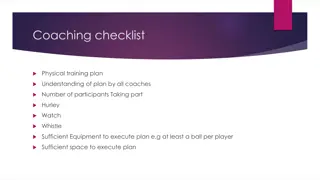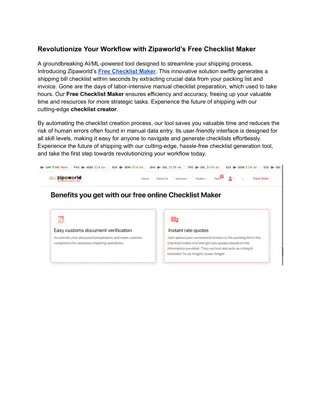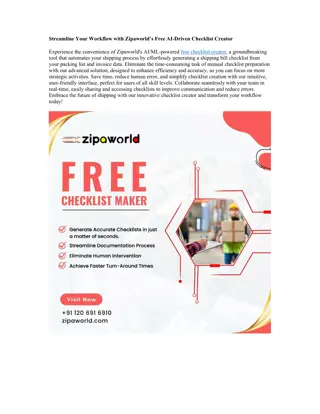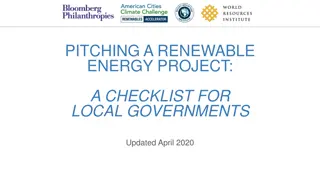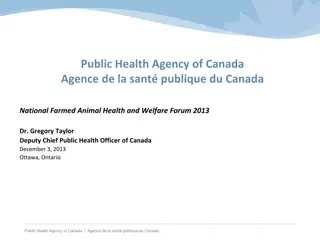Checklist for Managing Resistance to Change
Resistance to change is a natural part of human reaction to a shift in the environment. This checklist guides you through six steps to effectively manage and overcome resistance within an organization. Learn why people resist change, plan for resistance, seek out potential sources of resistance, deploy proactive resistance management, and more to ensure your project achieves the desired results.
Download Presentation

Please find below an Image/Link to download the presentation.
The content on the website is provided AS IS for your information and personal use only. It may not be sold, licensed, or shared on other websites without obtaining consent from the author.If you encounter any issues during the download, it is possible that the publisher has removed the file from their server.
You are allowed to download the files provided on this website for personal or commercial use, subject to the condition that they are used lawfully. All files are the property of their respective owners.
The content on the website is provided AS IS for your information and personal use only. It may not be sold, licensed, or shared on other websites without obtaining consent from the author.
E N D
Presentation Transcript
AGS Managing Resistance to Change (Checklist)
Checklist for Managing Checklist for Managing Resistance to Change Resistance to Change AGS AGS Resistance Resistance Management Management Checklist Checklist Resistance to change is a natural part of human reaction to a change in environment. Change managers need to be prepared to manage resistance to change to ensure their project achieves the desired results. Tool Tool AGS
The AGS Resistance Management Checklist will take you through the 6 steps in the process of managing and overcoming resistance to change in an organization. Resistance process overview: Why Do People Why Do People Resist Change? Resist Change? Don t understand it Fear of change No incentive Distrust Cling to habits Bad experience Peer pressure Lack of knowledge Stress
1. Plan for Resistance While a world without any employee resistance to change would make change management much easier, it s not the reality of human nature. You need to expect resistance and understand it s a normal part of reaction to change. Resistance Planning Resistance Planning You can plan for resistance by reading about resistance management to understand the reasons people resistant change at work and be prepared with strategies to overcome resistance to change when it occurs. Learn Reasons Study Change Resources Review Mitigation Strategies Use a Resistance Management Tool
2. Seek Out Potential Resistance Why would you want to go looking for employee resistance? Because if you can proactively address potential sources of resistance to change up front at the beginning of a change project, it can keep resistance problems from happening and spreading to others in the same department. Find Potential Find Potential Resistance Resistance Stakeholder Assessment Ask Supervisors Employee Surveys Review Workload Impact Assessment When seeking out proactive resistance, you want to look at the history of a stakeholder s change experience and at how this current change will be impacting them. People most likely to resist would be ones that showed resistance to a past change and those who are being majorly impacted by the current change.
3. Deploy Proactive Resistance Management Proactive resistance management is about trying to win over those being impacted by a change before resistance really has a chance to occur. Proactive Proactive Resistance Mgmt. Resistance Mgmt. Proactive resistance involves active communication and education designed to allay fears, address potential resistance points, and hopefully reassure someone enough that they will not have any reasons for resistance to change. Communication Education Vision Sharing Leadership Coaching Change Agents
4. Watch for Reactive Resistance While you can try to catch any potential resistance proactively, there will always be some that comes out of the blue that you weren t aware of. Identify Reactive Identify Reactive Resistance Resistance Watching for resistance throughout the change project will help you bring that resistance out in to the light where you can deal with it, rather than it staying in the shadows, possibly poisoning your project outcome. It s important to keep an eye out for resistance throughout the change project because the project itself may have caused reasons for resistance to change that an employee did not have at the start. Observe Behavior Ask Co-workers Ask Managers Survey Employees Look for Non- Participants
5. Deploy Reactive Resistance Management With proactive resistance management you were attempting to address a concern that might cause resistance. With reactive resistance management, you need to address a specific concern that a person or group of people already have. Reactive Resistance Reactive Resistance Mgmt. Mgmt. You want to make sure you listen to their sources of resistance to change and don t just assume you know what they re going to say. Someone has to fully trust that you care about their input before they ll listen to what you have to say. Listen Validate Earn Trust Address Concerns Reactive resistance management is about validating the person s feelings that are causing them to resist the change and then giving them the answers and reassurance that they need for overcoming resistance to change.
6. Document Resistance Management Process It s important that you document both the reasons for resistance to change brought up by different stakeholders as well as your strategies to overcome resistance to change. This information will be invaluable to the next change management team when they re doing their stakeholder analysis. Need Help with Need Help with Change Change Management? Management? It s also helpful for the organization and change management team to have so they can anticipate future resistance to change in the workplace, understand the sources of resistance to change, and the ways to overcome resistance to change that worked. It s what we do! Email us any time with questions at: support@airiodion. com


